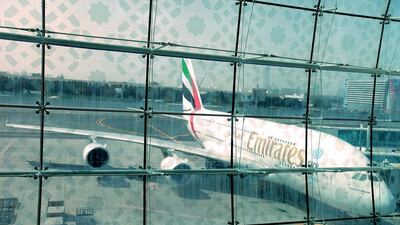Emirates Airline has a maximum time of two hours that its passengers can be kept inside an aircraft on the ground before the plane either takes-off or they are allowed to leave, the airline said.
The matter was raised this month after heavy fog affected operations at airports in Dubai and Abu Dhabi, causing lengthy delays on the ground in some cases.
“Emirates operational guidelines with regard to the length of time passengers can remain on board in an aircraft due to a departure delay or major disruption is two hours,” the airline said.
However, the Dubai-based airline said that the decision to let passengers leave the aircraft is “subject to airport authorities’ approval and the status of the facilities at that time”.
While Emirates had a maximum time limit on keeping passengers grounded inside aircraft, other UAE-based airlines maintain a more flexible policy.
“Any aircraft delay needs to be considered according to specific circumstance, and therefore our policy needs to remain flexible,” said an Etihad Airways spokesman. The budget carrier flydubai said: “Once passengers have boarded the aircraft we aim to ensure that their time on the ground is kept to a minimum and should there be a delay in departure we have a welfare policy in place.”
Saj Ahmad, the chief analyst at StrategicAero Research said that because the majority of airports in the Arabian Gulf “are not constrained, delays on the ground are the exception, not the norm”.
“This, too, is a reason why no uniform policy between carriers exist,” he said. Last week, the UAE’s aviation regulator said it would consider whether there should be a limit on how long passengers can be kept inside a plane on the ground.
Saif Mohammed Al Suwaidi, the director general of the GCAA, said that he has asked for a “benchmark report” to be presented to him this week; the report would reveal how regulators in other countries deal with ground delays. Mr Al Suwaidi said a committee would be addressing the matter soon, adding that the GCAA would intervene only if the matter concerned the safety of passengers.
“But if it’s about the passenger inconvenience, then it will be left for the airline to decide,” he said.
In the United States, for domestic flights operated by US carriers, passengers can be kept inside an aircraft for no more than three hours before the flight takes off or is cancelled. If an airline exceeds this, it could be hit with a fine of up to US$27,000 per passenger.
The US policy has, however, been blamed for an increase in cancelled flights. Tony Tyler, the head of the International Air Transport Association (Iata), the airlines lobby group, has called the US policy an example of “amazingly un-smart regulation”.
The airline association is inclined to leave the decision in the hands of airlines.
“When regulating, we also ask that governments consider which areas are best handled by market forces,” said Iata. “Airlines compete to offer good customer service. That is very clear in the Gulf region. The negative publicity around such events as this is a very strong incentive to avoid repetition.”
In Europe passengers have the right to request to leave the aircraft after a delay of five hours and after one hour must be given access to the plane’s bathrooms and drinking water.
selgazzar@thenational.ae
Follow The National's Business section on Twitter

